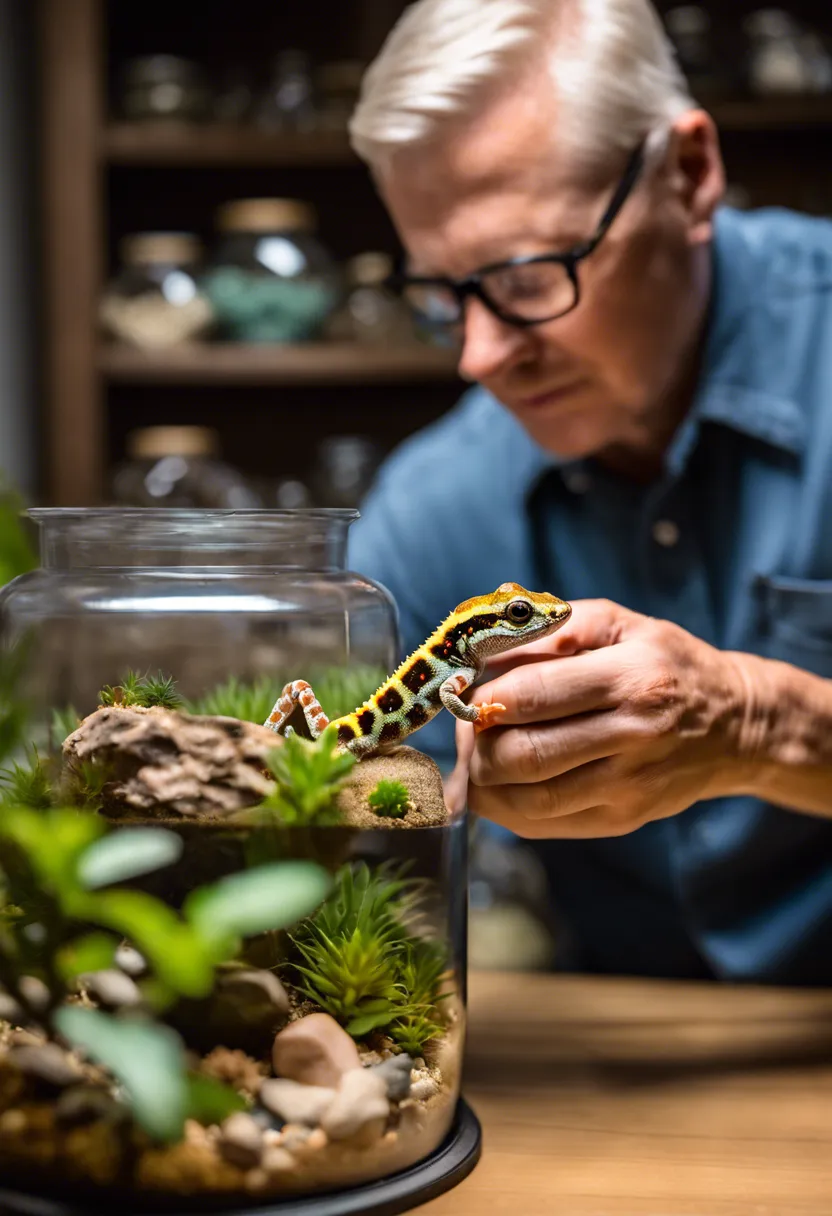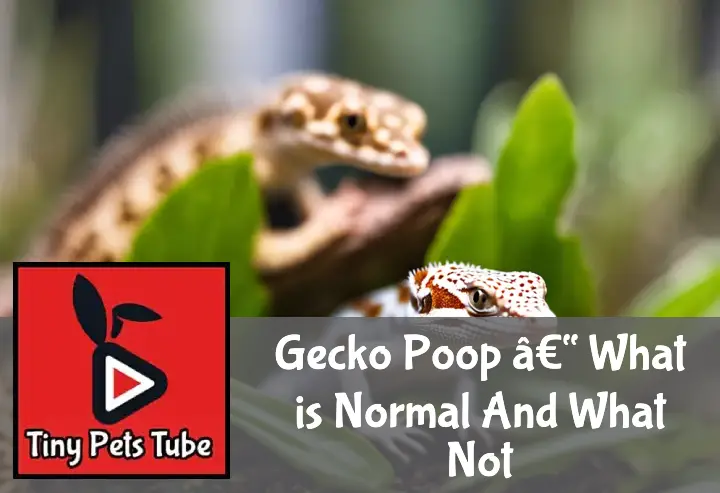Ever had one of those days where you find yourself googling about Gecko Poop? Well, welcome to the club! As a proud gecko parent, it’s essential to know what’s normal and what’s not in their droppings.
In this post, we’re diving into the nitty-gritty of gecko poop – from its usual look and feel to the alarm bells you should watch out for. So buckle up, because things are about to get real… poopy. “Keep reading about Gecko Poop – What is Normal And What Not?”
Key Takeaways
- Normal gecko poop consists of a dark, solid part and a white, chalky part.
- Abnormalities can include diarrhea, discolored feces, or absence of the white part.
- Changes in diet, stress, parasites or illness can cause abnormal poop.
- If abnormalities persist for more than two days, it’s recommended to consult a vet.
- Regular cleaning of the habitat helps monitor changes and prevent diseases.

Understanding Gecko Poop
Getting to grips with gecko poop can be a bit like reading tea leaves, but for your pet’s health. It’s not the most glamorous part of pet ownership, but it’s a window into their well-being.
The Importance of Monitoring Gecko Poop
Keeping an eye on your gecko’s fecal matter is like being a detective in the world of reptile health. Changes in their droppings can be early signs of illness in geckos, giving you a heads-up before things get serious. It’s all about spotting those subtle hints that something might be off, whether it’s stress, dietary issues, or something more sinister.
Regular checks mean you can adjust their diet if needed and catch any health concerns early. Think of it as your secret weapon in maintaining your scaly friend’s digestive health. Plus, it gives you peace of mind knowing you’re on top of things.
What Does Normal Gecko Poop Look Like?
So, what’s the scoop on normal gecko poop? Typically, we’re talking about small, firm brown pieces paired with white urate (that’s the reptile version of pee crystals). The brown part should be well-formed – think tiny chocolate chips – showing that your gecko is digesting properly.
The white urate shouldn’t be too hard or too soft; just right means they’re hydrated and healthy. Frequency-wise, expect to see these delightful little packages every few days depending on how much and how often they eat. Spotting these characteristics means you’re likely looking at a happy and healthy lizard doing its business as nature intended.
Abnormalities in Gecko Poop
Spotting weird stuff in your gecko’s poop can be a real “oh no” moment. It’s like the ultimate puzzle that nobody wants to solve. But hey, it’s crucial for keeping your little buddy healthy.
Changes in Color and Consistency
Ever noticed your gecko’s poop looking a bit off-color or funky in texture? Yeah, it’s not just you being overly observant. A change in gecko poop color change or abnormal feces consistency can actually scream “Houston, we have a problem.” It might be something as simple as a new food not sitting well with them or something more concerning like health issues knocking on the door.
Different colors and consistencies could point towards various dietary or health-related issues. For instance, too much of that fancy new insect treat could turn their usual dark and firm deposits into something more colorful and mushy. On the flip side, super hard and dry poops might mean dehydration or digestive woes. Keeping an eye on these changes is like playing detective but with less cool gadgets and more… well, poop.
Presence of Parasites or Worms
Finding creepy crawlies in your gecko’s droppings is enough to make anyone squirm. If you spot any parasites in gecko stool or signs of worm infestation symptoms, it’s time to ring up the vet faster than you can say “eww.” These uninvited guests can cause all sorts of trouble, from weight loss to serious health complications.
Common culprits include pinworms, which are pretty standard fare in reptile bellies but shouldn’t be partying it up in visible numbers. Then there are nastier ones that can hitch a ride through contaminated food or substrate. Spotting these invaders early on means you can get your scaly pal the help they need before things go south.
Blood in the Stool
Blood making an appearance where it definitely shouldn’t be is alarming, to say the least. If you’re seeing red in your gecko’s waste station, don’t play the waiting game—get to a vet pronto. This could signal anything from internal injuries after an adventurous leap gone wrong to more sinister health concerns lurking beneath the surface.
The presence of blood in reptile stool isn’t something to take lightly; it’s one of those flashing neon signs saying “emergency.” Whether it’s due to harsh bowel movements or something far more concerning like internal parasites or infections, getting professional advice is non-negotiable. After all, when it comes to health scares, better safe than sorry is the motto we’re rolling with here.

Causes of Abnormal Gecko Poop

When your gecko’s bathroom habits change, it’s like a red flag waving at you, saying, “Hey buddy, something’s up!” Let’s dive into what could be throwing your scaly friend’s system out of whack.
Dietary Issues
Ever seen what happens when you eat nothing but junk food for a week? Well, geckos don’t have the luxury of cheat days. Their diet is a fine-tuned machine that needs the right fuel to keep their digestion on track. Gecko diet problems often stem from nutritional deficiencies or chowing down on inappropriate snacks. It can lead to some pretty wonky gecko poop.
A balanced diet is crucial for these little critters. Without it, they might face issues like soft or discolored feces – a clear sign of trouble in paradise. Feeding mistakes with geckos aren’t just about what they eat but also how much and how often. Overfeeding or underfeeding can mess with their internal plumbing big time.
Illnesses and Diseases
Just like us, geckos can get sick, and their poop is one of the first places we’ll notice. Various diseases affecting gecko poop include nasty stuff like parasitic infections which can wreak havoc on their digestive system. If your gecko starts producing abnormal feces, it could be waving a big ol’ flag signaling health issues.
Symptoms of illness in reptiles’ feces aren’t always straightforward. Sometimes it’s as subtle as a slight change in color or consistency; other times, it’s more alarming signs like blood or mucus. These changes are critical clues that could point towards common health problems in geckos requiring immediate attention.
Stress and Environmental Factors
Imagine trying to do your business while someone blasts “Cotton Eye Joe” on repeat. Stressful, right? Geckos feel the same way about unsuitable living conditions – it messes with their digestion big time. Stress effects on gecko digestion are real and can lead to abnormal gecko poop.
Creating an ideal habitat for healthy digestion in reptiles involves more than just slapping together a terrarium with a heat lamp. Temperature fluctuations, improper humidity levels, and lack of hiding spots can all contribute to stress-induced bathroom woes for your gecko.
Adjusting terrarium conditions for geckos isn’t just about making them comfy; it’s about ensuring their digestive system runs smoothly without any hiccups – or should I say hic-poops? Keeping an eye out for signs of environmental stress in feces is key to maintaining not just a happy gecko but a healthy one too.
How to Monitor Your Gecko’s Poop
Keeping an eye on your gecko’s poop can tell you a lot about their health. It’s like being a detective, but for gecko poop.
Regular Check-ups
Taking your gecko for veterinary check-ups is crucial, not just for a pat on the back but for real health checks. These visits often include fecal analysis in reptiles, which might sound gross but is super important. It helps in the early detection of gecko diseases, catching issues before they become big, scary problems. Think of it as taking your car in for a service; it keeps everything running smoothly. Plus, these routine health assessments are a great way to ensure your scaly buddy stays happy and healthy. Regular reptile veterinarian visits are more than just a formality; they’re an essential part of pet care that can save you a lot of trouble down the line.
Keeping a Poop Diary
Now, onto something that might raise eyebrows: maintaining a poop diary for your gecko. Yes, it sounds odd, but hear me out. By tracking gecko defecation patterns, you’re essentially keeping tabs on their internal workings without needing x-ray vision. This diary becomes invaluable during vet visits, providing clear insights into your pet’s well-being over time. Noting down details like stool consistency and frequency helps in documenting reptile health changes, making it easier to spot when something’s amiss. Plus, having this log can significantly aid in the analysis of stool consistency and frequency, giving both you and the vet a head start if there are any concerns about your gecko’s health. So grab that notebook and start jotting down; it could make all the difference!
When to Seek Veterinary Help
Sometimes, gecko poop can tell you more than you’d think. Spotting the unusual early can save your scaly buddy a lot of trouble.
Persistent Abnormalities
Ever noticed your gecko’s droppings looking a bit off? Maybe they’re too soft, too hard, or just plain weird-looking. If this happens once in a blue moon, it might not be a biggie.
But if you’re seeing these abnormal gecko droppings day after day, it’s time to sit up and pay attention. Consistent oddities in their poop can be a red flag for underlying health issues. Whether it’s due to dietary mishaps or something more sinister like digestive problems, keeping an eye on your gecko’s bathroom habits is crucial.
Persistent changes in their feces shouldn’t be brushed off as just another quirky reptile behavior. It could be signaling something serious about your little critter’s health. So, if those strange poops keep popping up, consider it a sign from the universe (or at least from your gecko) that a trip to the vet is in order.
Accompanying Symptoms of Illness
Now, let’s say you’ve spotted some wonky gecko poop, but there’s more going on than just that. Maybe your gecko isn’t eating like usual, seems lethargic, or is shedding its skin way too often.
These are all symptoms of reptile diseases that shouldn’t be ignored when they accompany abnormal poop. It’s like your gecko is trying to send an SOS signal – and it’s your job to decode it! Changes in behavior or appearance alongside funky fecal matter are clear indicators that something’s amiss with your scaly pal’s health. Ignoring these signs could lead to worse problems down the line.
So if you notice these red flags waving high and mighty alongside peculiar poops, don’t hesitate to get professional help. Remember, catching issues early can make all the difference in managing gecko health concerns effectively.

To Wrap Up
Just like you’d be concerned if your goldfish started acting more like a toddler, it’s normal to worry about unusual Gecko Poop. Remember, consistency is key and any drastic changes could be a red flag.
So keep an eye on those little poop trails! Your gecko’s health might just depend on it. Stay curious, stay informed, and most importantly, stay cool as a cucumber (or a gecko!).


